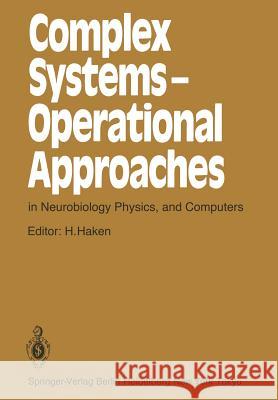Complex Systems — Operational Approaches in Neurobiology, Physics, and Computers: Proceedings of the International Symposium on Synergetics at Schloß Elmau, Bavaria, May 6–11, 1985 » książka
Complex Systems — Operational Approaches in Neurobiology, Physics, and Computers: Proceedings of the International Symposium on Synergetics at Schloß Elmau, Bavaria, May 6–11, 1985
ISBN-13: 9783642707971 / Angielski / Miękka / 2011 / 365 str.
Complex Systems — Operational Approaches in Neurobiology, Physics, and Computers: Proceedings of the International Symposium on Synergetics at Schloß Elmau, Bavaria, May 6–11, 1985
ISBN-13: 9783642707971 / Angielski / Miękka / 2011 / 365 str.
(netto: 192,11 VAT: 5%)
Najniższa cena z 30 dni: 192,74 zł
ok. 22 dni roboczych
Bez gwarancji dostawy przed świętami
Darmowa dostawa!
A great deal of the success of science has rested on its specific methods. One of which has been to start with the study of simple phenomena such as that of falling bodies, or to decompose systems into parts with well-defined properties simpler than those of the total system. In our time there is a growing awareness that in many cases of great practical or scientific interest, such as economics or the hu- man brain, we have to deal with truly complex systems which cannot be decomposed into their parts without losing crucial properties of the total system. In addi- tion, complex systems have many facets and can be looked at from many points of view. Whenever a complicated problem arises, some scientists or other people are ready to invent lots of beautiful words, or to quote Goethe "denn immer wo Begriffe feh- len, dort stellt ein Wort zur rechten Zeit sich ein" ("whenever concepts are lack- king, a word appears at the right time"). Quite often such a procedure gives not only the layman but also scientists working in fields different from that of the in- ventor of these new words the impression that this problem has been solved, and I am occasionally shocked to see how influential this kind of "linguistics" has become.











